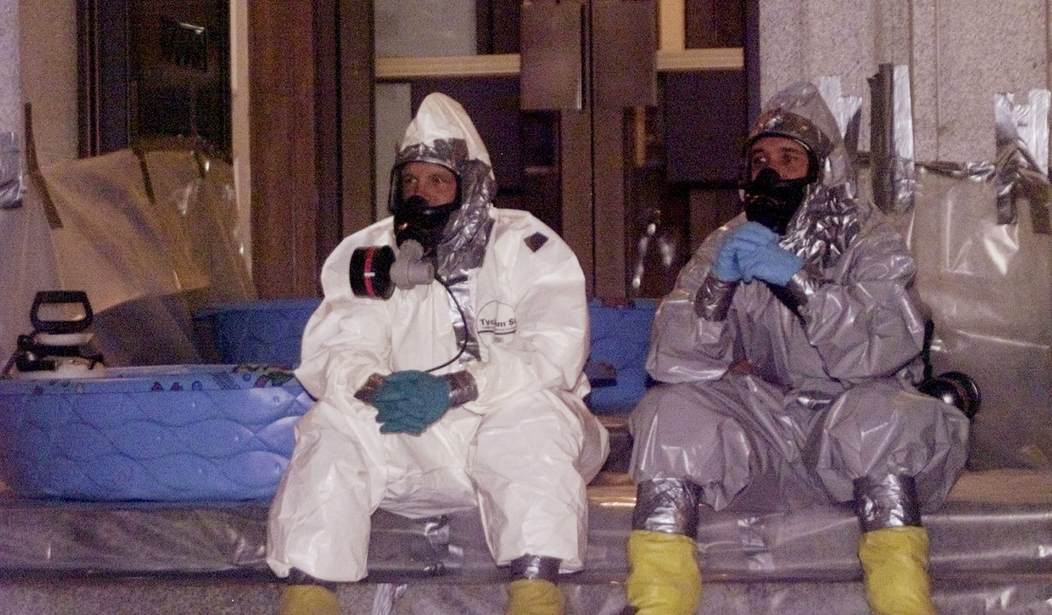WASHINGTON — The first Homeland Security secretary, who assumed the new position a year and a half after the 9/11 attacks, said America must “accept the reality that the threat surface has changed” since hijacked planes were flown into the World Trade Center and Pentagon.
Tom Ridge, on a panel with current Homeland Security Secretary Jeh Johnson at a Thursday Atlantic forum, was asked how many terrorist attacks the U.S. can anticipate in the coming year — and responded, “What type?”
“The number of actors has increased. The profile of those actors is significantly different than it was on September 10, 2001,” Ridge said. “There’s an inevitability to the attacks. There’s no way, if you take a look at what’s happened in France over the past six months, there’s a variety of means by which they can inflict their damage and you know, affect the psyche of a country and bring pain and suffering to families and communities.”
“They had a stabbing in Paris, they had a truck running over dozens of people in Nice, the mass shooting on November 13th and yesterday, they found gas cylinders in an automobile outside of Notre Dame [Cathedral]. So I think we should not — I think we should just accept the inevitability. But after 15 years in reflection, what I really think the country needs to do is accept the reality that it is a global scourge. Accept a reality that it will probably happen again, here.”
Ridge opined that America needs to “dial down some of the hyperbole and the hyperventilation” about terrorism, though, as far more people die in car accidents.
Johnson added, “Well, first of all, what constitutes a terrorist attack versus 15 years ago? …If you’re asking how many San Bernardino or Orlando-type attacks will we have in the year 2017, no national security, homeland security or law-enforcement expert is going to — is in a position to quantify it.”
The threat that concerns him most, the DHS secretary said, is “the prospect of another homegrown — or home born — violent extremist acquiring a weapon or a tool of mass violence and carrying out an attack someplace here, in the homeland.”
“I think that the public understands, in a free and open Democratic society, you cannot eliminate all risk, whether it’s a terrorist attack or a mass shooting or gang violence,” Johnson continued. “We cannot end it tomorrow. We can and we should reduce it as much as possible, consistent with our values and consistent with our laws.”
Ridge added that “by definition, democracies are soft targets.”
One of the most significant deficiencies in national security, the original Homeland Security secretary said, is the threat of biological agents.
“We took a look, particularly in 15 years after anthrax, one of the gaps, and there’s still gaps that the next secretary is going to try and close. One of the most significant gaps, of my judgment is bio defense,” Ridge said. “I mean, face it, this was 15 years ago, anthrax, and yet we still don’t have a strategy. We don’t have a consolidated effort to build a capability to respond as quickly as we possibly can. We were slow in our response to H1N1. We were slow on our response to Ebola. We saw Zika coming, we were slow response. And this is probably more to do with agencies external to DHS.”
“But frankly, that’s a real threat — whether the terrorist weaponize a pathogen or Mother Nature throws one at us. I think that one of the most serious, long-term threats from either source, is in the biological area. And 15 years after anthrax, we’re still struggling to have a strategy and an operationalize a capability to respond quickly with a vaccine and recover from an incident, particularly with a contagious pathogen. It’s a real problem.”
Ridge added, “God forbid, the terrorist, I mean, we know that terrorists play around with bio.”








Join the conversation as a VIP Member